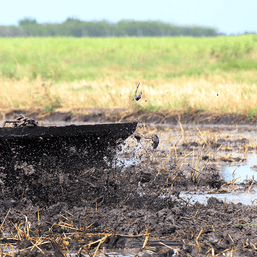SUMMARY
This is AI generated summarization, which may have errors. For context, always refer to the full article.
![[REFLECTION] Change and original sin](https://www.rappler.com/tachyon/2023/11/change-original-sin-nov-30-2023.jpg)
These days, the question that occupies many who refuse to surrender to feelings of powerlessness is this: what form of “communal action” can bring about decisive change in our governance?
In a previous Pulse Asia survey, it was found that as high as 69% of Metro Manila respondents support protest rallies, an indication that there is a deep desire among our people to clear out the muck that stinks heavily in the corridors of power.
At the same time, of those who support the clamor for change, it is significant that only 16% would actually go and add to the body count.
Why is this so?
Twenty-six percent of those who support protest actions said they had more important things to do. Another twenty-six percent said they don’t expect things to change even if they do go. Twenty-one percent said they need to earn a living. Seven percent saw no alternative, and six percent said they are “tired” of people power.
Most likely, this sampling of Metro Manilans about sums up where most Filipinos are today.
There is a deep skepticism over the efficacy of “people power” and other such conventional tools for expressing popular disfavor. But then, that we are not out in the streets should not be taken as a sign that there is not enough critical mass that could be mustered when necessary. It simply means that to many, the streets have ceased to be an effective arena for asserting popular will. Instead, most of us would rather go about our daily business, faithfully doing what we need to do. Our families need to survive, and work commitments must be done and finished.
In truth, it is a great nuisance that time and again, our governance so dysfunctions that we all have to stop and go out into the streets just so we can say enough is enough. It is getting to be a bore and quite an effort to those of us who have grown old doing these things.
I belong to the generation that grew up under the First Quarter Storm of the early ’70s. Rage swelled our throats and choked our lungs. The placard and the microphone replaced the books in our hands. Somewhere, in the din of voices, I could hear faintly the feeble hollowness of much of the rhetoric. But we were all too drunk, too full of the dream of a distant classless society to really take notice.
Then the iron hand of martial law struck us down. Some fled to the hills and fell at the foot of some lonely mountain, their voices forever silenced. Some morphed into technocrats and served as willing functionaries in the hope that good may still be done within the system. Some, like me, remained at the edges, working quietly among those in the margins until it was time to come out of the woodwork and raise a flag during those heady days when, unarmed, we surprised ourselves by overthrowing the mighty. For one brief moment, we forgot our fractiousness and felt like a nation.
Decades after, I and my friends – a number of whom are wizened veterans of the streets and detention cells – faced a group of young people in their 20s who asked us in bewilderment: “What happened to your generation? Why has it all come to nothing, all your political activism and sacrifices?”
Behind the question was the unvoiced accusation that we were not smart enough. Those of us who learned to walk with the poor in silence allowed ourselves to get sidelined and mostly worked in the shadows. Meanwhile, the oligarchs and their political minions resurfaced in full force and brazenly hijacked the people’s historic project in both the 1986 and 2001 uprisings.
There is an easy answer that comes to mind as to how this happened.
We all got middle-aged and lost the fire in our bellies. We got fixated with our old ideologies and lived in a time warp. We got weighted with too many bad memories, which some drown in mugs of frothy beer in some murky joint, whistling in the dark a long lost song, a fallen anthem to the lacerations of a failing vision.
Also, we had to play catch-up with our life cycle as a generation. At a time when we should have been breathing easily and idling away in retirement, we are still bustling about picking up professional careers that should have occupied us decades ago if we had lived in normal times. Many simply got too tired and too old to keep working in poor communities and decided to get a life of their own, with jobs that at least offer a modicum of security and comfort.
But underneath this layer of reasons is a deeper, more disturbing thought: why is my own generation not exempt from falling into the same pit of corruption?
Many are frontline faces in various scandals. Friends who were activists in the university turned into willing tools and mouthpieces for lying regimes.
On a larger scale, why do revolutions devour their own, burying former comrades in “killing fields” or making them disappear inside the walls of what the novelist Solzhenitsyn calls the “Gulag archipelago”? Why is it that in the end, revolutions of whatever kind become mere transfers of power from one oppressive class to another, usually greedier and more oppressive than the one before?
The simple and most straightforward answer is that while people are a mixture of good and bad, the bad side usually wins. The Christian tradition calls this “original sin.” It is not, at first instance, from the social environment that evil comes. It is from within, says Jesus. It begins from that place where we make our choices between good and evil, and comes to fruition as purpose or intention. It then finds expression in actions that sooner or later get routinized into habits, values, norms, systems, and organizations. This is why evil can be systemic, entrenched in social systems or organized into oppressive norms. If left untrammeled by countervailing forces, it will run haywire and bulldoze all that stands in its way in its ruthless ascent to absolute power.
ALSO ON RAPPLER
- Reject Israel occupation of Palestine, churches tell Filipino Christians
- Churches turn bloody red to honor ‘our persecuted brothers and sisters’
- Cebu human rights lawyers push for anti-cult law
- In Gaza, call to prayer rings out from bombarded mosque
Corruption is primarily a product of the human condition. The monster is not out there; it is in our hearts. Our current politics of silence, or shall we say reticence, is of a piece with the growing awareness that while some are more guilty than others, we are all somehow complicit, unable or unwilling to engage the rot that is eating away at the center of our social order.
In a way, it is good that we are all stumped, befuddled as to the way forward. It is forcing us to grow inward, shifting the venue of struggle from the streets to social media and then, more deeply, in our own souls.
Perhaps it is time to confront our own shadows as a people, and not just the monsters that we always suspect to be connected with the government. – Rappler.com
Melba Padilla Maggay is president of the Institute for Studies in Asian Church and Culture.
1 comment
How does this make you feel?
![[Newspoint] A fighting presence](https://www.rappler.com/tachyon/2024/07/thought-leaders-a-fighting-presence.jpg?resize=257%2C257&crop=441px%2C0px%2C1080px%2C1080px)
![[ANALYSIS] Promoting PPP via a sufficiently empowered media](https://www.rappler.com/tachyon/2024/04/PPP-and-media.jpg?resize=257%2C257&crop=365px%2C0px%2C720px%2C720px)


![[OPINION] No seat at the table: Where are youth in UN’s anticorruption conference?](https://www.rappler.com/tachyon/2023/12/youth-anti-corruption-conference-december-13-2023.jpg?resize=257%2C257&crop=414px%2C0px%2C1080px%2C1080px)
![[The Wide Shot] Peace be with China](https://www.rappler.com/tachyon/2024/07/wideshot-wps-catholic-church.jpg?resize=257%2C257&crop=311px%2C0px%2C720px%2C720px)
![[OPINION] A critique of the CBCP pastoral statement on divorce](https://www.rappler.com/tachyon/2024/07/TL-cbcp-divorce-statement-july-19-2024.jpg?resize=257%2C257&crop=285px%2C0px%2C722px%2C720px)
![[REFLECTION] Mary, Mother of the West Philippine Sea](https://www.rappler.com/tachyon/2024/07/may-mother-west-ph-sea-july-19-2024.jpg?resize=257%2C257&crop=293px%2C0px%2C751px%2C750px)
![[OPINION] Ignorance and prejudice](https://www.rappler.com/tachyon/2024/07/tl-ignorance-and-prejujdice.jpg?resize=257%2C257&crop_strategy=attention)

Thanks to the very inspirational article entitled, “Change and original sin,” by MP Maggay. Perhaps, the First Quarter Storm generation can start this shift of the venue of struggle “from the streets to social media and then, more deeply, in our own souls.” Then whatever lessons they will have learned – share it with the next generation of Filipinos. This might be the key to the next historic People Power.